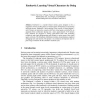187
click to vote
AAMAS
2012
Springer
13 years 9 months ago
2012
Springer
Recent research has shown that virtual agents expressing empathic emotions toward users have the potentiality to enhance human-machine interaction. To provide empathic capabilitie...
157
click to vote
IEAAIE
2011
Springer
2011
Springer
A Cognitive Agent Model Using Inverse Mirroring for False Attribution of Own Actions to Other Agents
14 years 5 months ago
This paper presents a cognitive agent model capable of showing situations where self-generated actions are attributed to other agents, as, for example, for patients suffering from ...
173
click to vote
TSI
2010
14 years 8 months ago
2010
In this paper, we present a Web-based framework for interactive deictic and sign language virtual agents. Our framework is a DOM-Integrated Virtual Agents architecture, which has b...
131
click to vote
ICIDS
2010
Springer
14 years 11 months ago
2010
Springer
Emohawk is a narrative-based serious game designed to be a supportive tool for teaching basics of virtual agents development at universities and high-schools. Emohawk is built util...
113
click to vote
IAT
2010
IEEE
15 years 1 days ago
2010
IEEE
It is widely acknowledged that providing explanations is an important capability of intelligent systems. Explanation capabilities are useful, for example, in scenario-based traini...
115
click to vote
IWC
2002
15 years 1 months ago
2002
The notion of trust has been virtually absent from most work on how people assess and choose their information sources. Based on two empirical cases this study shows that software ...
102
click to vote
ENGL
2007
15 years 2 months ago
2007
—Realistic motion and natural-looking simulations require a thorough understanding of human movement control strategies. This work presents an initial developed on virtual agents...
117
click to vote
IJVR
2008
15 years 2 months ago
2008
Recent work in behavioral animation has taken impressive steps towards a virtual human. As for intelligent virtual agents, abbreviated "IVAs", the behaviors displayed in ...
101
click to vote
ATAL
2010
Springer
15 years 3 months ago
2010
Springer
The Restaurant Game demonstrates an end-to-end system that captures and generates social behavior for virtual agents. Over 15,000 people have played The Restaurant Game, and we ha...
129
click to vote
ATAL
2010
Springer
15 years 3 months ago
2010
Springer
In this paper, we present a new trajectory planning algorithm for virtual humans. Our approach focuses on implicit cooperation between multiple virtual agents in order to share th...







